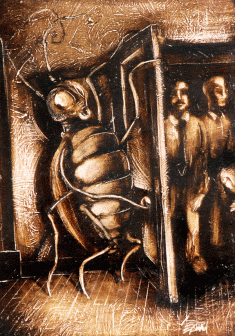Monday, April 7, 2014
Existentialism, Empathy and The Metamorphosis
Existentialism is a philosophical theory that cannot be defined by a sentence or two. From my understanding of existentialism, it centers around an individuals power to give their own life meaning. One must be able to do so, despite the obstacles in their way, in order to live a meaningful life. It is not the world that gives a life meaning but the actions they take in their life that makes their life meaningful. By demonstrating no control, loneliness, abandonment and responsibilities, Kafka's illustrates a clear view of existentialism by almost making The Metamorphosis a "what not to do" for existentialists. Existentialism is trying to prove that the reason humans live life is to find their own identity and to be able to self reflect on their decisions and what has come from them. One is essentially the sum of their actions and choices in life. In Franz Kafka's The Metamorphosis, Gregor felt that his transformation into an insect had taken away the meaning and purpose of his life. The only thing Gregor had on his mind was work and business, and he therefore made his identity his job, so when he became unable to work his identity fell to its demise. This is a parallel to existentialism, as Gregor actually possessed the ability to give meaning to his new life the entire time, he was just unable to see that. Had Gregor been able to overcome his despair and alienation, he may have been able to live a new life, despite his transformation. The annexing of all of this led to Kafka presenting his reader with a protagonist that completely lacked an identity and who was controlled by everyone around him. Thinking existentially, because Gregor shut himself out of everything and made no choices for himself that built his self-hood, he is essentially nothing. Gregor needed a balance in his life. Existentialism also has a lot to do with the harmony and balance in one's life. One must pay attention to oneself and try to make themselves the best they can be (what Gregor failed to do as a human). However, if a person chooses themselves over society, he will lose society's support. But if a person chooses society over them self, he will lose his individuality.
Along with learning about Existentialism and how it connects to The Metamorphosis, we watched a video called "Empathic Civilisation" to try to tie empathy into everything as well. The video argues that we are all born into this world with empathy already programmed in us. "We are all soft wired, some of the primates all of the humans..." (Jeremy Rifkin). It explains how life is fragile and life will soon turn to death, and if we do not understand that, then nothing will come of anything. A big part of that revolves around our own freedom to make out own choices and to exist on this earth to our own liking. There is no template or rules that are followed to determine who we are and how we should be. In the video, Rifkin talked about a life that consists of empathic drive which is essentially the drive to belong in the world. "The first drive is the drive to actually belong. Its an empathic drive," (Jeremy Rifkin). Kafka brings this concept to his writings, including The Metamorphosis. His protagonists are helplessly isolated and alienated from the world, however, Gregor did choose to shut the door and keep to himself. He works hard his whole life for other people, and as selfless as he is, there is no balance in his life so that is why he ultimately finds himself as a bug. As an insect, Gregor now has the opportunity to live for himself. We cannot help but feel bad for Gregor Samsa. When the reader reads The Metamorphosis they can identify with his character. As we read Kafka, we feel isolated and helpless ourselves because of his modern ways of writing, and in turn makes us feel like the protagonist. We empathize with Gregor, because we are feeling the way he feels. We all empathize with others; that is what builds communities, nations, states, religions and many more as the video stated. The audience of the novella witnesses Gregor's big picture and his consequences for not living a life filled with meaning, an existential life. He failed to take responsibility for his existence and by reading about the unfortunate life of Gregor Samsa, we experience his suffering through empathy.
Subscribe to:
Post Comments (Atom)



No comments:
Post a Comment